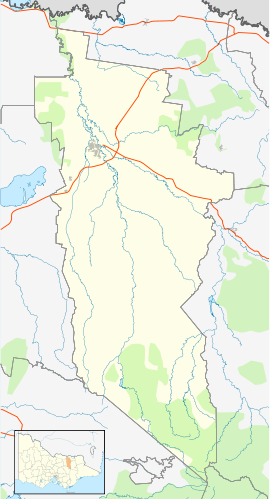Milawa, Victoria
|
Milawa Victoria |
|
|---|---|

Milawa Mustards cottage
|
|
| Coordinates | 36°26′S 146°26′E / 36.433°S 146.433°ECoordinates: 36°26′S 146°26′E / 36.433°S 146.433°E |
| Population | 592 (2011 census) |
| Postcode(s) | 3678 |
| Location |
|
| LGA(s) | Rural City of Wangaratta |
| State electorate(s) | Ovens Valley |
| Federal Division(s) | Indi |
Milawa is a town in Victoria, Australia, located on Snow Road, 18 kilometres (11 mi) south-east of Wangaratta, in the Rural City of Wangaratta. At the 2011 census, Milawa and the surrounding area had a population of 592. It is at the northern end of the King Valley wine region, between the King River to the west and Ovens River to the north (the meet in Wangaratta).
Milawa is the hub of the Milawa Gourmet Region which offers a wide range of produce.
The town is the home to the Brown Brothers vineyards, which have operated in the town since 1889. Milawa is also home to the Milawa Cheese Company and Milawa Mustards.
Milawa was named in 1874 after being known only as The Square for many years prior. The word Milawa is aboriginal in origin and is said to mean "flat land". In these early times the Emu Hotel occupied one corner (built by James Henley) and the Commercial was on the opposite corner (built by Colin Gardner). General merchandise was available at McKenzie's store and there were two blacksmiths, a saddler, a bootmaker, a carpenter and a doctor, Dr McSweeney. (Milawa mustards now occupies the Emu Hotel site, the Milawa Hotel occupies the Commercial Hotel site and Food on Wood the McKenzies site). The Post Office opened on 7 July 1862, known as Oxley until 1870 and Oxley Plains until 1874.
A Mechanics Institute comprising a free library and a spacious hall opened in 1889. A court was established in Milawa in 1874 by the visiting Magistrate Mr Howitt, in a room leased from the Emu Hotel. The police station was located at the Commercial Hotel and in 1917 moved to McKenzies store upon becoming vacant. The lock-up adjoined the Emu Hotel.
A dairy company was established in 1891 and by 1896 was one of the biggest dairy companies in Australia (the Milawa Cheese Company now occupies this site)
Football and cricket began to be played on an organised basis in the 1890s.
Milawa was connected to electricity from the Kiewa hydro scheme in 1939.
...
Wikipedia

